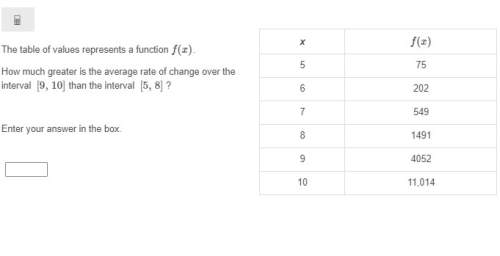
Mathematics, 05.07.2019 01:30 raman2003
The table of values represents a function f(x). how much greater is the average rate of change over the interval [9, 10] than the interval [5, 8] ? enter your answer in the box.


Answers: 1


Another question on Mathematics

Mathematics, 21.06.2019 17:00
The table below shows the height of a ball x seconds after being kicked. what values, rounded to the nearest whole number, complete the quadratic regression equation that models the data? f(x) = x2 + x + 0based on the regression equation and rounded to the nearest whole number, what is the estimated height after 0.25 seconds? feet
Answers: 2


Mathematics, 21.06.2019 20:30
Venita is sewing new curtains. the table below shows the relationship between the number of stitches in a row and the length ofthe row.sewingnumber of stitches length (cm)51 131532024306what is the relationship between the number of stitches and the length? othe number of stitches istimes the length.o. the number of stitches is 3 times the length.
Answers: 2

Mathematics, 21.06.2019 20:30
Does the function satisfy the hypotheses of the mean value theorem on the given interval? f(x) = 4x^2 + 3x + 4, [−1, 1] no, f is continuous on [−1, 1] but not differentiable on (−1, 1). no, f is not continuous on [−1, 1]. yes, f is continuous on [−1, 1] and differentiable on (−1, 1) since polynomials are continuous and differentiable on . there is not enough information to verify if this function satisfies the mean value theorem. yes, it does not matter if f is continuous or differentiable; every function satisfies the mean value theorem.
Answers: 1
You know the right answer?
The table of values represents a function f(x). how much greater is the average rate of change over...
Questions





Biology, 29.01.2021 18:30


Mathematics, 29.01.2021 18:30





Biology, 29.01.2021 18:30


Mathematics, 29.01.2021 18:30

Mathematics, 29.01.2021 18:30

Advanced Placement (AP), 29.01.2021 18:30

History, 29.01.2021 18:30


English, 29.01.2021 18:30

Mathematics, 29.01.2021 18:30









